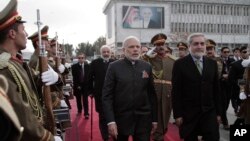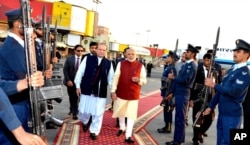Indian Prime Minister Narendra Modi’s visit to Afghanistan and Pakistan this week is a new step in the three countries' effort to find a more normal pattern of existing alongside each other, regional analysts say.
While in Kabul on Friday, Modi helped inaugurate the new parliament building, a $90 million structure that his government built and paid for.
At the ceremony, he pledged India’s support for Afghanistan and urged regional powers, including Pakistan, to work together for peace. In the aftermath of the fall of the Taliban, India has played a key role in Afghanistan’s reconstruction and rehabilitation, pledging $2 billion in assistance.
India has contributed to building medium and large infrastructure projects, including roads and hospitals.
After leaving Kabul, Modi made an unannounced stop in Lahore, where he met with Pakistani Prime Minister Nawaz Sharif. The visit was the first by an Indian prime minister to Pakistan in more than a decade.
Pakistan has long accused New Delhi of using Afghanistan to fuel the insurgency in Pakistan, an accusation Indian and Afghan officials reject.
Afghan leaders say their relationship with Pakistan and India is based on mutual interests and that Afghanistan's ties to those countries should not be interpreted as animosity toward one or the other.
The former Indian government led by Prime Minister Manmohan Singh ensured that India did not extend its cooperation with Afghanistan to military affairs, to avoid making Pakistan nervous; however, with the inception of Modi's government, India has moved toward assisting Afghanistan’s military as well.
India recently paid for at least three Russian-made MI-25 attack helicopters for Afghanistan. The helicopters are equipped with machine guns, rockets and grenade launchers.
Modi defended his country’s different types of assistance to Afghanistan, arguing that India was contributing to Afghanistan’s development.
Nothing 'mysterious'
“You know that India is here to contribute, not to compete; to lay the foundations of the future, not light the flame of conflict; to rebuild lives, not destroy a nation,” he said. “You have judged us by what you see, not what others tell you, including about the mysterious Indian consulates.”
The prime minister apparently was referring to Pakistani accusations that India uses its consulates in the Afghan cities of Kandahar and Jalalabad to encourage instability in Pakistan.
Upon the establishment of the new government in Kabul in 2002 and in later years, Kabul has struggled to strike a balance in its relations with Islamabad and New Delhi. Some security analysts say India’s footprint in Afghanistan has pushed Pakistan to support elements of the Taliban and the related Haqqani network, or at least ignore their sanctuaries in its territory. Islamabad denies the charges.
Analysts, however, say they believe that normalcy is expected to emerge in the Afghanistan-Pakistan-India triangle and that economic incentives in the region are prompting this shift.
Sayed Farhad Hashemi, a political analyst in Kabul, said he believed that Pakistan needs stability in Afghanistan for its own needs.
“Pakistan’s increased need for energy coming from the Middle East and Central Asia leaves it with limited options other than reliance on Afghanistan,” Hashemi said. “The change in the region and the urge for economic cooperation may contribute to a change in Pakistan’s foreign policy in the region.”
Recently, Afghanistan, Pakistan, India and Turkmenistan struck a deal worth $10 billion to build an 1,800-kilometer gas pipeline that will go from Turkmenistan to India, through the other two countries.





